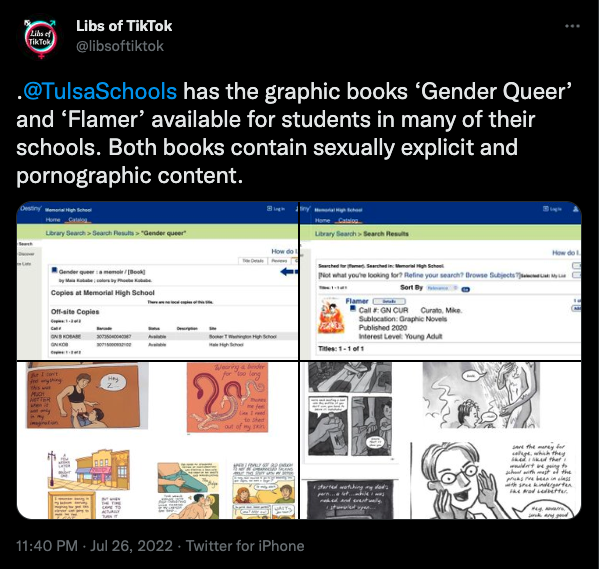
Education, Culture & the Family
‘Experts’ to parents: Don’t believe your own lying eyes
September 24, 2022
Brandon Dutcher & Trent England
Perhaps you’ve seen news stories these last several days celebrating what is called “Banned Books Week.” For virtue-signaling school employees and media activists, it’s the most wonderful time of the year.
Several organizations are promoting this made-for-media pseudoevent. For example:
“In celebration of Banned Books Week, the Human Rights Campaign (HRC) is partnering with Drag Queen Story Hour to provide families everywhere with an opportunity to celebrate LGBTQ+ stories and spread a message of inclusivity and acceptance for all,” HRC says. Some of the LGBTQ+ themed books are about “transgender” children.
The American Library Association warns darkly that “in a time of intense political polarization, library staff in every state are facing an unprecedented number of attempts to ban books.”
The First Unitarian Church of Oklahoma City hosted a “Banned Book Read-Out” event on Sunday. The church’s lead minister went so far as to read aloud passages from the most “banned” book of the 2021-22 school year, Gender Queer.
The left-of-center group PEN America, while grudgingly acknowledging that “parents and guardians ought to be partners with educators in their children’s education,” nevertheless insists that “public schools are by design supposed to rely on the expertise, ethics, and discretion of educational professionals to make decisions.” Indeed, “in too many places, today’s political rhetoric of ‘parents’ rights’ is being weaponized to undermine, intimidate, and chill the practices of these professionals.” (Note the use of snicker quotes when discussing parents’ rights.)
The National Education Association laments that “four out of 10 banned books had LGBTQ+ characters or themes.”
In short, the thinking is that “all books should be in the library,” as First Lady Jill Biden declares flatly. “All books. This is America. We don’t ban books.”
‘Banned’ Books? Not Exactly
It turns out that Mrs. Biden may have inadvertently spoken the truth when she said “we don’t ban books.” For as theologian and seminary president Albert Mohler points out, the entire premise of “Banned Books Week” is based on a lie. By PEN America’s own definition (“What Is a Book Ban?”), ban doesn’t necessarily mean ban. “If any parent complains about any book and it is placed on, say, a higher or lower shelf in the library,” Mohler says, “it can be claimed that’s now a banned book.”
“They’ve had to redefine what it means for a book to be ‘banned,’” he says. “And that’s intellectually dishonest.” Unlike in repressive regimes such as North Korea (where possessing a fragment of the New Testament is a capital crime) or China or Iran, in the United States “there is no real honest problem of a lack of access to just about anything anyone wants to see, anyone wants to hear, anyone wants to read.”
Bipartisan Agreement: Gender Queer Is Pornography
Let us now turn our attention to the most “banned” book of the 2021-22 school year: Gender Queer by Maia Kobabe. Perhaps you’ve heard of it.
On July 26, 2022, the Twitter account LibsOfTikTok reported that Tulsa Public Schools “has the graphic books ‘Gender Queer’ and ‘Flamer’ available for students in many of their schools. Both books contain sexually explicit and pornographic content.”

“This is disgusting,” Oklahoma Secretary of Education Ryan Walters, a Republican, said the next day. “It must end!”
“This is inappropriate, sexually explicit material,” said Oklahoma State Superintendent of Public Instruction Joy Hofmeister, a Democrat. “It’s pornography that does not belong in any public school library.” (Hofmeister’s no dummy. She doesn’t want to be on the receiving end of an ad like this.)
Indeed, as Amy Haywood noted in a recent article, “for books like Gender Queer, I’m unable to replicate the pictures depicted in the book for this article, as I would be subject to legal penalties.”
‘Professionals’ Try to Gaslight Parents
U.S. Supreme Court Justice Potter Stewart famously said of pornography: “I know it when I see it.” In like manner, Oklahoma parents know what they know. Nevertheless, incredibly, some educators, teacher unions, religious-left leaders, and activists (those with and without bylines) think they can gaslight parents. Consider:
The American Library Association says Gender Queer was “banned, challenged, and restricted for LGBTQIA+ content, and because it was considered to have sexually explicit images.” Considered to have.
PEN America says Gender Queer “has been called ‘obscene and pornographic.’” Has been called pornographic.
Former Norman schoolteacher Summer Boismier, who provided access to Gender Queer when she shared a library-linked QR code with her students, told Education Week that Oklahoma’s “education secretary had been posting online a few YA titles, Gender Queer being one of them, Flamer being another, and associating those titles with obscenity and pornography.” Associating them with pornography.
In a 1,566-word editorial masquerading as a news story, Journal Record reporter Janice Francis-Smith defended Boismier against the “false accusation surrounding ‘pornographic’ material.” False accusation.
Who You Gonna Believe?
Like many states, Oklahoma law makes it a crime to cause “any child to view any obscene materials.” Is that a “ban” on books? Not really. Oklahoma adults, including teachers and school librarians, are permitted to own, access, or create obscene materials. But like cigarettes, they cannot pass them on to children.
Advocates for pornography in schools often hide behind classics like To Kill a Mockingbird or Tom Sawyer. These are great works worthy of reading, but nobody includes them in elementary school curricula. Does that mean they’re “banned” in elementary schools?
Behind the claims of book banning are adults bent on using children as pawns for their sexual ideologies and fetishes.
PEN America would have us trust the “ethics” and “discretion” of educational professionals. But if some of those professionals can’t even pass the simple Potter Stewart test, should parents be expected to trust them? Parents should never be cowed by their supposed betters, the “experts” and “professionals” asking them: Who you gonna believe, me or your own lying eyes?